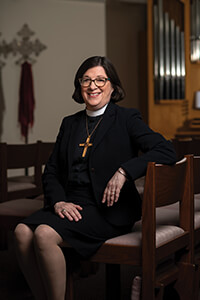Putting the pieces together
December 22, 2015
It has been just more than two years since I began this call. I’m often asked what has been the greatest surprise. Certainly the amount of travel has been a surprise, but the greatest has been the complexity and scope of the ELCA. As bishop of the Northeastern Ohio Synod, I had a pretty good grasp of the ministries in its 20 counties, but now my territory includes all of the counties in all of the states and the Caribbean, along with international partnerships.
This church does a lot. All over the world. All of the time. At your churchwide office, spreadsheets track the progress of the six goals we set for ourselves in the 2013-2016 operational plan. This just tracks the work of churchwide staff, not that of congregations, synods, social ministry organizations, colleges and universities, seminaries, conciliar relationships, camps, campus ministries, separately incorporated ministries, federal chaplaincies and missionary personnel.
At its November 2015 meeting, the ELCA Church Council received the report of the Theological Education Advisory Council. One of the striking revelations in this report was the number of ways we deliver theological education in the ELCA. We do this through seminaries, of course, but also through colleges and universities, lay schools, certificate programs, synodical schools and congregational schools.
This can be seen as a rich flourishing of creative and diverse delivery of theological education, or it can be seen as a symptom of a disconnected approach. With the best intentions, groups within the church see a need and develop a solution for a particular issue without considering what else might be in place or even how the solution fits in with the mission of the whole. We have one synod that has two lay academies and neither one knew the other existed.
The ELCA constitution states: “The congregations, synods and churchwide organization of this church are interdependent partners sharing responsibility in God’s mission.” This is constitutional language for “We are church together.” Some days we are, but many days and in many ways we aren’t. I’m not singling out theological education as an egregious example, but as one instance among many where we aren’t really connected with each other. This exposes the cultural sense that the church is a voluntary association like the Rotary or the Girl Scouts, where one can come and go as one chooses, and not a new creation joined to Christ in baptism.
As Peter wrote to the churches in Asia Minor: “But you are a chosen race, a royal priesthood, a holy nation, God’s own people, in order that you may proclaim the mighty acts of him who called you out of darkness into his marvelous light. Once you were not a people, but now you are God’s people; once you had not received mercy, but now you have received mercy” (1 Peter 2:9-10). God created the church. God has put us together through baptism as the body of Christ. You just don’t opt in or out of that.
Looking through the lens of Martin Luther’s explanation of the eighth commandment, I believe that good and faithful members, congregations, synods and the churchwide organization have tried to carry out God’s mission. The issue, I think, is that the mission has become at once universal and very particular. We are doing everything and we are doing it in pixels — pixels that don’t come together to make a complete picture.
Throughout 2016 we — all of us — are going to take a look at the future directions and priorities of this church. We will build on the work already done on this issue. We will engage all the expressions of this church, it will be part of the work of the 2016 ELCA Churchwide Assembly, and it will clarify and sharpen our mission.
Apart from God our work is in vain. This process must depend on the Spirit’s guidance. This isn’t merely a technical problem to be solved, but a time for this church to engage intentionally and consistently in a process of communal spiritual discernment. We aren’t just inviting God into this process at the beginning and thanking God at the end. Instead we, as a church, will open ourselves up to the invitation of God to be part of God’s reconciling work through Christ in the world. Join me.

